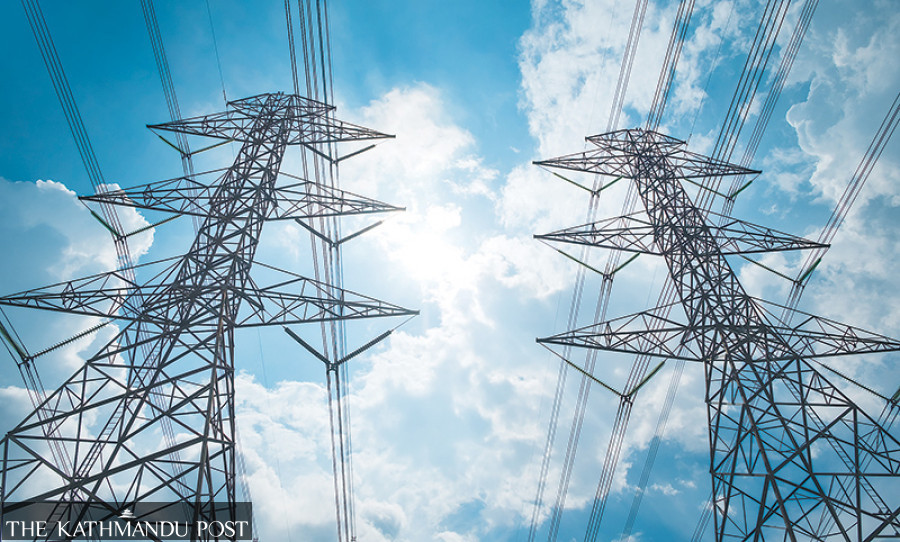Four years into signing, the agreement is languishing in Parliament, as US officials are in town to make a final push.

Post File Photo
Delay in parliamentary ratification of the Millennium Challenge Corporation Nepal Compact coupled with the Covid-19 pandemic has slowed the implementation of the projects under the American aid programme.
Two infrastructure projects are to be executed under the $500 million grant assistance from the United States in Nepal–electricity transmission and road improvement.
But the American aid, known commonly as MCC (Millennium Challenge Corporation), signed in September 2017 has run into controversy in Nepal over some concerns–whether the agreement supersedes Nepalis laws, whether it has any military connection, and whether the US would control the rights over the intellectual property generated through the implementation of projects, among others.
According to a senior official at the Millennium Challenge Account-Nepal, a special purpose vehicle established to implement the development projects under the MCC, preparations for the electricity transmission project to be developed under the US programme have been affected due to the delay in its parliamentary ratification.
“We have already prepared all tender documents for the construction of substations and transmission lines,” Khadga Bahadur Bisht, executive director at the MCA-Nepal, told the Post. “But we are awaiting parliamentary ratification before calling tender bids.”
He said that even though there was no initial plan to wait for the parliamentary ratification before issuing tender, the MCA-Nepal sought to wait until the ratification because “reputed” contractors might not be interested to work amid uncertainty.
“Since they have to spend a lot of money even to participate in the bidding process and they want confirmation whether the project will move ahead before they participate in the bids. Their efforts will be wasted if they cannot sign the contract after winning the bids,” said Bisht.
Under the programme, a 315km double-circuit 400 kV transmission line will be built from Butwal to the Ratmate area of the Nuwakot district. Once completed it is expected to provide a vital missing link for power projects of different river basins to the existing high voltage grid in Nepal.
There are five sections under the electricity transmission line– Butwal to the Indian border, Butwal-Damauli, Damauli-Ratmate, Ratmate-Hetauda, and Ramate-Lapsephedi. The project will have three substations–New Damauli substation in Tanahun district and New Butwal substation at Bhumahi in Nawalparasi (West) district and a substation at Ratmate, Nuwakot.
A cross-border transmission line between Butwal and Gorakhpur is considered a vital infrastructure to facilitate electricity trade between Nepal and India.
An agreement was signed on Wednesday in New Delhi for the construction of the Butwal-Gorakhpur Cross-Border Transmission Line. About 15km of the 135-km power line lies within Nepali territory, which Nepal will build at its own expense. On the Indian side, the Nepal Electricity Authority and the Power Grid Corporation of India will jointly build the power line on the Indian side. The 400kV line will have a capacity of transporting around 3,500 megawatts.
The transmission line project in Nepal, however, has failed to take off, and there have hardly been any talks as yet on the road improvement project to be developed under the MCC due to controversy over the American aid project.
Under the road project, a 77-km road from Bhalubang, Dang to the border point between Bardiya and Dang, which is part of the East-West Highway, will be upgraded.
“A pilot design work of this section has been completed,” said Bisht.
According to Bisht, the task of land acquisition is remaining for most part of the alignment of the transmission line, although it has already acquired land for a substation at Ratmate in Nuwakot. Other two substations in Damauli and Bhumahi, Nawalparasi (West) will be built on the lands of the Nepal Electricity Authority so these will not require land acquisition.
“The Covid-19 restrictions too prevented the MCA-Nepal from starting the land acquisition process,” Bisht told the Post.
“Before the first lockdown was imposed on March 24 last year, we had issued a notice for land acquisition in three districts by giving a 35-day notice to the people whose lands were to be acquired. But the process could not move ahead because the 35-day deadline expired during the lockdown,” said Bisht.
The proposed transmission line will connect 10 districts.
According to Bisht, a foreign consultant involved in the resettlement plan for those whose land would be acquired, also abandoned the task after the lockdown affected the preparatory work.
Nepal immediately needs to improve its electricity transmission lines given the surplus power it will be generating soon with some big hydropower projects set to be completed. There are already reports of electricity wastage with all turbines of the 456 megawatt Upper Tamakoshi Hydropower Project coming into operation.
Officials say had the MCC Nepal Compact got a parliamentary ratification, things would have moved forward smoothly. The MCC Nepal Compact was registered in Parliament in July 2019, a little less than two years after Nepal signed up to the agreement. However, it is languishing in Parliament due to differences among Nepali political parties. The agreement was to come into force by July 30, 2020 after its parliamentary ratification as per Nepal’s commitment.
Even though the land acquisition process has yet to start for the transmission lines, Bisht said that the MCA-Nepal believes it could be done alongside the tender process. The MCA-Nepal, however, has already acquired land for a substation at Ratmate in Nuwakot and fenced the land to stop encroachment.
Likewise, the task of forest clearance and realignment of the proposed transmission line in a 30km section in different parts of the country is also remaining, according to Bisht.
According to the MCA-Nepal, it has already completed the Environmental Impact Assessment (EIA), and based on the EIA, it was preparing to count the number of trees that needed to be chopped before the first lockdown imposed on March 24 last year.
“We were also in the final process of obtaining approval from the Ministry of Forest and Environment for going to the forest and counting the trees to be felled down,” said Bisht. “We were also working to obtain approval for forest clearance from the forest offices of the districts concerned.”
The $500 million offered by the United States under the MCC is the single largest grant from any donor in Nepal’s history.
However, politicisation of the MCC now has created divisions in society, with opposition to the US programme reaching upto the grassroots in Nepal.
After the return of Nepali Congress’ Sher Bahadur Deuba, who was the prime minister when the MCC was signed in 2017, to power in July this year, the government was preparing to move the MCC Nepal Compact in Parliament for its ratification. But Deuba’s coalition partner, the Communist Party of Nepal (Maoist Centre), which coincidentally was his key ally back in 2017 also, had some reservations.
Finance Minister Janardan Sharma, a Maoist leader, on September 3 then wrote to the MCC headquarters seeking clarifications on as many as 11 questions and some supplementary concerns, some of which were dubbed by observers ridiculous and uncalled for. The questions included if the MCC agreement was above Nepal’s constitution, if it was part of the Indo-Pacific Strategy, if the US aid programme was indeed “selfless” and if the US was pushing Nepal to accept it because of Nepal’s geostrategic location.
The MCC headquarters on September 8 dispatched a 13-page clarification to Minister Sharma, attempting to address all the concerns raised by Nepal. The US response came a day before the visit of Fatema Z Sumar and Jonathan Brooks, vice president and deputy vice president at the MCC respectively, to Nepal.
The two top US officials since Thursday have been holding a series of meetings with Nepali politicians. During his meeting with the US delegation, KP Sharma Oli, chair of the main opposition CPN-UML, conveyed that when his party was in power, it was ready for the MCC’s parliamentary ratification, but since it is in opposition now, it has not made any position. The UML has said the ball is in the ruling alliance’s court.
Maosit Centre chair Pushpa Kamal Dahal told the MCC officials on Friday that since a lot of questions have been raised, a national consensus would be required before the compact is ratified through Parliament. The CPN (Unified Socailist), yet another coalition partner of Deuba, has said it would not favour anything “that is against national interest.” Deuba’s yet another coalition partner, Janata Samajbadi Party, has said it would take a decision on the basis of national consensus.
On Friday evening, Sumar and Brooks called on Prime Minister Deuba.
Deuba has made it clear that his government is for the MCC’s parliamentary ratification.
The whirlwind of meetings by the MCC officials in Kathmandu, starting a day after sending the clarification, making it clear that MCC Nepal Compact cannot be “amended at this time” has made it pretty clear that the US is making a final push for its parliamentary ratification.
Observers say the MCC officials’ arrival in Nepal is aimed at hammering home one point to the leadership in Nepal–take it or leave it.
Nepal had initially committed to ratifying the programme from Parliament by September 2019.
With parliamentary ratification delayed, the MCC stopped releasing its part of the resources for about a year since October 2019 needed for investing in the preparatory works.
“But we have been receiving the US funding since September last year,” said an official of the MCA-Nepal.
Parliamentary ratification is one of the six conditions for the implementation of the MCC.
“Other five conditions have already been met,” said Bisht, “and everyone is now waiting for the compact's endorsement from the House.”













